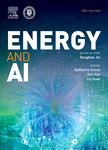Perspective: Predicting and optimizing thermal transport properties with machine learning methods
作者机构:University of Michigan-Shanghai Jiao Tong University Joint InstituteShanghai Jiao Tong UniversityShanghai 200240China School of Mechanical Engineering and Birck Nanotechnology CenterPurdue UniversityWest LafayetteIN 47907United States
出 版 物:《能源与人工智能(英文)》 (Energy and AI)
年 卷 期:2022年第8卷第2期
页 面:148-161页
核心收录:
学科分类:0502[文学-外国语言文学] 050201[文学-英语语言文学] 05[文学]
基 金:support by the National Natural Science Foundation of China(No.52122606)
主 题:Thermal transport properties Machine learning Prediction Optimization
摘 要:In recent years, (big) data science has emerged as the “fourth paradigm in physical science research. Data-driven techniques, e.g. machine learning, are advantageous in dealing with problems of high-dimensional features and complex mappings between quantities, which are otherwise of great difficulty or huge cost with other scientific paradigms. In the past five years or so, there has been a rapid growth of machine learning-assisted research on thermal transport. In this perspective, we review the recent progress in the intersection between machine learning and thermal transport, where machine learning methods generally serve as surrogate models for predicting the thermal transport properties, or as tools for designing structures for the desired thermal properties and exploring thermal transport mechanisms. We provide perspectives about the advantages of machine learning methods in comparison to the physics-based methods for studying thermal transport properties. We also discuss how to improve the accuracy of predictive analytics and efficiency of structural optimization, to provide guidance for better utilizing machine learning-based methods to advance thermal transport research. Finally, we identify several outstanding challenges in this active area as well as opportunities for future developments,including developing machine learning methods suitable for small datasets, discovering effective physics-based descriptors, generating dataset from experiments and validating machine learning results with experiments, and making breakthroughs via discovering new physics.



